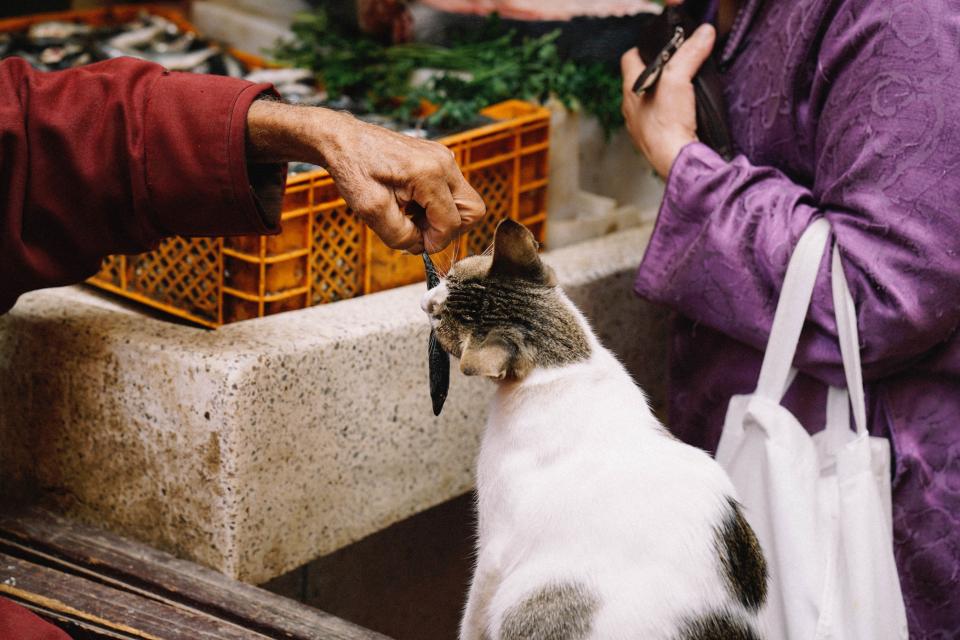This comprehensive guide dives deep into the question of whether spinach is a safe food for cats. We'll explore the nutritional value of spinach, examine the potential dangers, and provide expert advice on safely incorporating spinach into your feline friend's diet, if at all.
Part 1: The Nutritional Profile of Spinach

1.1 A Wealth of Vitamins and Minerals
Spinach is a nutritional powerhouse for humans, brimming with essential vitamins and minerals, including:
- Vitamin A: Crucial for healthy vision, immune function, and cell growth. Spinach is a good source of beta-carotene, which the body converts into Vitamin A.
- Vitamin C: An antioxidant that supports immune health, collagen production, and wound healing. It also plays a role in iron absorption.
- Vitamin K: Vital for blood clotting and bone health. Spinach is a rich source of this vitamin.
- Iron: Essential for oxygen transport in the blood. Spinach provides a good amount of iron, but its bioavailability is lower for cats than for humans.
- Magnesium: Important for muscle function, nerve function, and blood sugar control. Spinach is a good source of this vital mineral.
- Potassium: Contributes to healthy blood pressure and muscle function. Spinach contains a significant amount of potassium, but excessive intake can be harmful to cats.
- Folic Acid: Essential for cell growth and division. Spinach provides a good source of folate, which is crucial during pregnancy and for red blood cell formation.
1.2 Antioxidant Powerhouse
Spinach is packed with antioxidants, which protect cells from damage caused by free radicals. These antioxidants may play a role in preventing chronic diseases such as heart disease and cancer in humans. However, their role in feline health is less well understood.
1.3 Dietary Fiber
Spinach contains dietary fiber, which is important for digestive health in humans. Fiber helps regulate bowel movements and can promote a feeling of fullness. However, cats are obligate carnivores and have shorter digestive tracts, so their bodies are not well-equipped to break down plant fiber effectively.
Part 2: The Case for Caution: Potential Risks for Cats

2.1 Oxalates: A Potential Kidney Stone Risk
Spinach contains oxalates, which are compounds that can bind to calcium and form kidney stones in humans. While this is less of a concern for cats, excessive oxalate intake can still pose a potential risk, especially for cats with pre-existing kidney issues.
2.2 High Potassium Content: A Risk for Cats with Kidney Issues
Spinach has a high potassium content, and excessive potassium can lead to hyperkalemia, a condition where the blood has too much potassium. This can be dangerous for cats, particularly those with kidney disease or heart problems.
2.3 Digestive Upset: A Common Issue
Spinach, like other leafy greens, can cause digestive upset in cats if consumed in large quantities. Symptoms may include vomiting, diarrhoea, and gas. This is primarily due to the high fiber content and the difficulty cats have in digesting plant matter.
2.4 Potential for Nutritional Imbalances
Spinach is high in vitamins and minerals, but it is not a complete food source for cats. Feeding too much spinach can lead to imbalances in their diet, potentially causing other health problems.
Part 3: Can Cats Safely Eat Spinach? The Verdict
3.1 Small Amounts are Generally Okay for Healthy Adult Cats
In general, small amounts of cooked spinach are unlikely to harm a healthy adult cat. However, it's crucial to consult with your veterinarian before offering any new foods, including spinach, to your cat. They can provide personalized advice based on your cat's individual health needs, including pre-existing conditions.
3.2 Avoid Raw Spinach
Raw spinach can be difficult for cats to digest and may contain harmful bacteria. Always cook spinach thoroughly before offering it to your cat.
3.3 Avoid Spinach in Large Quantities: Moderation is Key
Even if cooked, excessive spinach consumption can lead to the risks mentioned above, especially the potential for oxalate and potassium accumulation. Limit spinach to small, occasional treats, and observe your cat closely for any adverse reactions.
Part 4: Safe Ways to Incorporate Spinach (If at All)
4.1 Cooked Spinach: The Safest Option
The safest way to offer spinach to your cat is by cooking it thoroughly and then adding it in small quantities to their food.
4.2 Spinach Supplements: A Potential Alternative
If you're concerned about your cat's nutritional intake and want to explore spinach-related supplements, discuss this with your veterinarian. They can recommend appropriate dosages and types of supplements based on your cat's needs, age, and health status.
4.3 Cat-Specific Supplements: A Safer Choice
It's important to remember that cats have specific nutritional requirements that are different from those of humans. Commercial cat food formulas are designed to meet these needs. Consider supplementing your cat's diet with cat-specific vitamins or minerals instead of relying on spinach.
Part 5: Recognizing Signs of Spinach Toxicity in Cats
5.1 Vomiting: A Common Symptom
One of the most common signs of spinach toxicity is vomiting. If your cat vomits after eating spinach, it's important to contact your veterinarian immediately.
5.2 Diarrhoea: A Possible Sign of Digestive Upset
Spinach can also cause diarrhoea in cats, especially if they eat a large quantity. This is a sign of digestive upset and should be monitored closely.
5.3 Lethargy: A Sign of Potential Illness
If your cat is lethargic or seems unwell after eating spinach, it's essential to seek veterinary attention. Lethargy can be a sign of underlying health issues, and prompt action is necessary.
5.4 Kidney Problems: A Potential Long-Term Risk
In severe cases, spinach toxicity can lead to kidney problems, especially in cats with pre-existing conditions. Long-term excessive oxalate intake can also contribute to kidney stone formation.
Part 6: What to Do if Your Cat Eats Spinach
6.1 Monitor Your Cat Closely: Observe for Any Changes
Keep a close eye on your cat after they have eaten spinach. Look for any signs of illness or digestive upset, such as vomiting, diarrhoea, lethargy, or changes in appetite.
6.2 Contact Your Veterinarian: Seek Expert Advice
If you notice any symptoms of spinach toxicity, contact your veterinarian immediately. They can assess your cat's condition and recommend appropriate treatment.
6.3 Consider Inducing Vomiting: Only Under Veterinary Guidance
In some cases, your veterinarian may recommend inducing vomiting if your cat has eaten a significant amount of spinach. However, it's crucial to follow their instructions carefully and never induce vomiting without their guidance.
Part 7: The Spinach Dilemma: Addressing Common Concerns
7.1 Can Kittens Eat Spinach?
Kittens are more sensitive to dietary changes, so it's best to avoid spinach altogether. Their digestive systems are still developing, and spinach can be difficult for them to digest, leading to digestive upset and potential health problems.
7.2 Is It Okay to Give My Cat Spinach Every Day?
No, it's not advisable to give your cat spinach every day. Even small amounts can accumulate over time and lead to potential health problems, such as hyperkalemia or oxalate build-up.
7.3 Can I Give My Cat Spinach Juice?
Spinach juice is not recommended for cats. It contains high levels of potassium and oxalates, which can be harmful, especially for cats with kidney issues.
7.4 Can Cats Eat Spinach in Their Cat Food?
Some commercial cat foods may contain spinach as an ingredient. However, it's important to check the ingredients list and avoid foods that contain excessive amounts of spinach. Look for balanced cat food formulas that are specifically designed to meet the needs of felines.
7.5 Is Spinach a Good Source of Iron for Cats?
While spinach contains iron, it's not a particularly good source for cats. Their bodies have difficulty absorbing iron from plant sources. Commercial cat foods provide a more readily available form of iron for their specific needs.
7.6 Can Cats Eat Spinach Leaves?
Yes, cats can eat spinach leaves, but only in small amounts and cooked thoroughly. This is primarily due to the difficulty cats have in digesting raw plant matter.
7.7 Can Cats Eat Spinach Salad?
Spinach salads are not recommended for cats. They often contain ingredients that are toxic to cats, such as onions, garlic, and grapes.
Conclusion: Making Informed Decisions for Your Feline Companion
While spinach offers nutritional benefits for humans, it's not a safe or recommended treat for cats. While small amounts of cooked spinach may be acceptable for healthy adult cats, it's crucial to exercise caution and consult with your veterinarian. Excessive consumption can lead to digestive upset and potential health problems. Always ensure that your feline friend's diet is tailored to their individual needs and that they receive a balanced diet from appropriate cat food formulas. By adhering to these guidelines, you can ensure your feline friend remains healthy and happy.
Everyone is watching
-

Are Cat Ribs Flexible? Understanding Their Anatomy
CATS & KITTENSThis article delves into the fascinating world of feline anatomy, exploring the flexibility of cat ribs and ho...
-

Can Cats Eat Bananas? (Everything You Need to Know)
CATS & KITTENSThis article dives into the intriguing question of whether cats can safely enjoy the sweet, yellow fruit, bana...
-

Cat Lifespan: How Long Do Cats Live?
CATS & KITTENSThis comprehensive guide explores the factors influencing the lifespan of our feline companions, providing ins...
-

Can Cats Get COVID-19? What You Need to Know
CATS & KITTENSThis article will delve into the fascinating world of feline COVID-19 susceptibility. We'll explore whether ca...
-

Can Cats Eat Eggs? A Complete Guide to Egg Safety for Your Feline Friend
CATS & KITTENSWhen it comes to treating our furry companions, we all want to ensure we're doing what's best for them. Eggs...
